 |
Home  4NRX Pet Pharmacy 4NRX Pet Pharmacy  Felimazole (Methimazole) Felimazole (Methimazole) |
|
|||||||||
|
|
Felimazole (Methimazole)
What is Felimazole (Methimazole) used for? Felimazole (Methimazole) is a hormone treatment prescribed to treat dogs suffering from an overactive thyroid. The medication operates by lowering hormone production in the thyroid gland to return the body to stable levels. Your veterinarian may prescribe it to treat other unlisted conditions, as well. How should I use Felimazole (Methimazole)? Strictly follow your veterinarian's instructions while using Felimazole (Methimazole) to get the safest and most effective results from treatment. One tablet is normally given every eight hours, but your dog's particular dosage may differ based on its current health and the severity of its symptoms. Never change the form of the tablets prior to use by splitting or crushing them as this may destroy or alter the effects of their contents. Always ask your veterinarian any questions you have regarding the medication to ensure the correct administration. What are the side effects of Felimazole (Methimazole)? Felimazole (Methimazole) may cause side effects in some patients including:
More serious side effects that may require emergency medical attention are sensitive skin, severe skin rash that is blistering or peeling, bloody urine or stools, darkened urine, discolored stools, or jaundice. Contact your veterinarian as soon as you experience any symptoms that are intense or worrying to make sure the correct response is taken to prevent further complications. Please Note Felimazole (Methimazole) should not be used to treat dogs that are pregnant or breastfeeding. It is also important to disclose if your pet has a blood cell disorder, weakened immune system, or liver disease as these conditions may cause unexpected complications during treatment. Strictly follow all instructions provided to you by your veterinarian while using Felimazole (Methimazole). Optimum and safe dosage can differ based on the dog and the condition being treated. As this medication may be unsafe for certain dogs, it is essential you always inform your veterinarian if your pet is pregnant or breastfeeding, as well as if it has any allergies, other illnesses, or ongoing health conditions, and if it is taking any other form of medication, supplements, or herbal products. Immediately seek emergency medical care if your dog has an allergic or hypersensitive reaction. Common signs of a reaction include hives, swelling, skin rashes, chest pains, as well as trouble breathing or swallowing. 

|
||||||||||||||||||||||